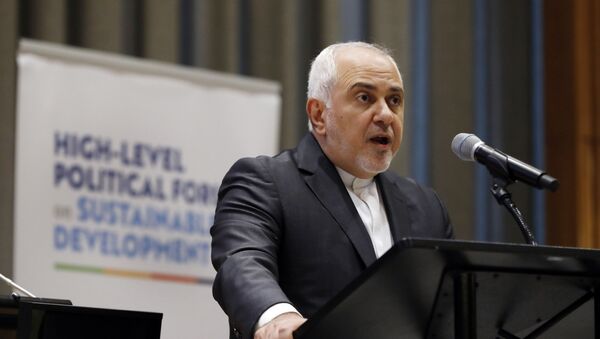According to a senior US official, the Trump administration is not closing the door to potential nuclear talks on the JCPOA with Iran by sanctioning Zarif, whom it does not consider a significant decision maker.
"You might have noticed that we actually withdrew from the JCPOA [Joint Comprehensive Plan of Action] a little over a year ago, so we do not consider him [Zarif] to be our primary point of contact," the official said. "If we do have an official contact with Iran, we would want to have contact with somebody who is a significant decision-maker".
A senior Trump administration official told reporters on Wednesday that the US Department of State will review on a case-by-case basis whether the sanctioned Zarif can travel to the United Nations headquarters in New York.
"On the question regarding travel, specifically travel to the United Nations… the State Department will evaluate specific circumstances related to this designation on a case-by-case basis consistent with existing laws and obligations," the State Department official said. "This includes the United Nations headquarters agreements".
The United States will continue to uphold its obligations under the United Nations Headquarters Agreement, the State Department official said, adding that with respect to other travel to the United States "eligible officials traveling for official United Nations duties will be immune from arrest while exercising that functions".
In addition, the Trump administration has not placed any restrictions on foreign leaders to communicate with sanctioned Iran Foreign Minister Mohammad Zarif.
"President Trump has been very open that he is ready to speak to the senior leadership in Tehran, and that he had certainly not prevented any of our friends or allies from communication with him as well", the official said. "The President has placed no restrictions on elected officials having conversations with foreign counterparts".
Iran has not accepted the US offer to initiate dialogue.
"[US President Donald Trump] is absolutely sincere in his offers of dialogue. The Iranians have chosen not to accept them", the official said on Wednesday.
According to the US official, the Iranian Foreign Affairs Ministry has allegedly engaged in and funded efforts to influence foreign elections.
"[Iran's] Ministry of Foreign Affairs and its high-ranking officials have engaged in and funded efforts to influence elections", the official claimed.
Meanwhile, Zarif has responded to the US move, observing that Washington considers him "such a huge threat".
The US' reason for designating me is that I am Iran's "primary spokesperson around the world"
— Javad Zarif (@JZarif) 31 July 2019
Is the truth really that painful?
It has no effect on me or my family, as I have no property or interests outside of Iran.
Thank you for considering me such a huge threat to your agenda.
Ties between the United States and Iran soured last year after Washington pulled out of a nuclear deal with Tehran and reimposed sanctions. Germany, France and the United Kingdom said they wanted to preserve the 2015 JCPOA agreement, also known as Iran nuclear deal.
In May, Iran exceeded the limit set under the nuclear treaty on its uranium stockpile after accusing Germany, France and the United Kingdom of not doing enough to shield the country from US sanctions.
Iran said it would continue rolling back its commitments in early September if EU countries did not stand up to "US economic terrorism," although Foreign Minister Zarif promised that the roll-back could be reversed.


